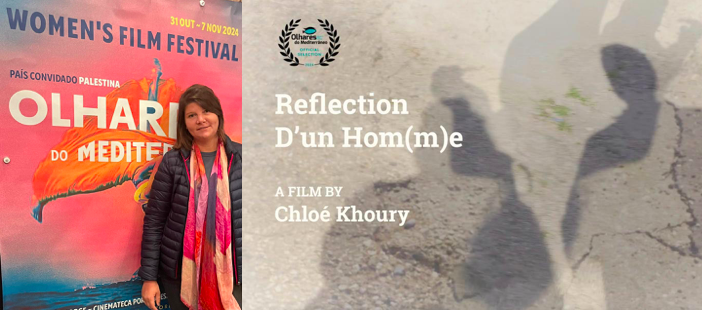
The film Between Homes by Chloé Khoury was screened at the Olhares do Mediterrâneo Festival in Portugal. This event, which celebrates female filmmakers from the Mediterranean region, highlights the richness and diversity of women’s creative expression. In an interview with This Is Beirut, Chloé Khoury shared her unique cinematic experience.
Chloé Khoury's film, Between Homes, is a five-minute introspective journey between Lebanon and France. At the festival, other films were also screened and received special mentions, including The Caterpillars by Michelle and Noel Keserwany, and The Sea and the Waves by Liana and Renaud.
In Between Homes, Chloé Khoury explores the sense of belonging and the concept of "home" through a visual and personal approach. This short film stands out for its symbolic and poetic imagery, reflecting Chloé Khoury’s writing style. This unique form of expression is infused with her perception of Lebanon, of other places and countries where she has lived without fully settling, of people she has met, and of future encounters yet to come. "For fifteen years, I had everything. I had it all, yet something was missing… Myself. I was the one who was missing," she says, facing the camera in her film. Her play with light and shadow is likely inspired by the cinematic language of Muriel Aboulrouss, who captures the fleeting poetry of the world and its people through the camera lens, as Chloé Khoury had completed an artistic residency with her. This Is Beirut interviewed the filmmaker.
When asked, "What is home to you?" Chloé Khoury responded, "It’s a feeling of well-being, made up of experiences, memories, and connections. It’s my daily life, my friends, my family, everything I’ve lived through. This deep connection with Lebanon has been a part of me since childhood."
On a more personal note, she adds, "It’s what wakes me up in the morning, drinking my coffee on the balcony with a view of the sea, listening to the birds sing. It’s also greeting my neighbors from the balcony, lowering and raising that famous basket, hearing the honks on the street and the hum of generators. My 'home' is my friends, my family, everything I’ve experienced, my loves... It’s a profound love for this land, a bond with Lebanon that has been rooted in me since I was young. I was already asking my mother, even before I understood what war was, how I could make a difference for Lebanon. It’s in my DNA. When I go through hard times, I feel strength in being here, as if Lebanon, like a parental figure, reassures me and says, 'I’ll always be there.'"
Asked about her choice to use cinematic language, she explains, "I began my artistic journey with writing, but I always wanted to turn my words into films. In 2021, a filmmaking program in London allowed me to create my first short documentary about Lebanon, where I interviewed young expatriates, asking them to share memories through typically Lebanese objects. This experience convinced me of cinema’s power—not to appeal to an audience, but to express my vision in my own way. If my films resonate with others, that would be wonderful. Cinema, for me, is a way to explore and share my relationship with the world and my country."
She adds, "Cinema reaches a wide audience through its visual and auditory nature. I try not to impose a perception; each person should interpret what they see according to their own feelings. Passionate about the silver screen since I was very young, I am now certain that this is the path for me. The camera has allowed me to travel beyond my limits, to places I never imagined, and to meet extraordinary people, breaking down barriers and enriching my relationships."
Regarding the potential impact of Lebanese cinema abroad, Chloé Khoury affirms, "I am convinced that Lebanese cinema can have an impact. The talent is immense, and many Lebanese films are winning awards. The artistic residency with Muriel Aboulrouss, a Lebanese filmmaker, for example, aimed to develop a distinctly Lebanese language, without conforming to Western or Eastern standards. For me, Lebanese cinema is an act of resistance, a preservation of our identity. Filmmakers like Michel Kammoun and Philippe Aractingi have perfectly captured this sense of resilience and attachment."
Finally, Chloé Khoury highlights cinema’s ability to make a difference: "The power of cinema goes beyond entertainment; it tells stories and crosses borders. At a festival, I watched an incredible Palestinian film depicting life in a camp in Syria, a project undertaken by a young filmmaker after the death of his friend, who had taught him how to use a camera. Even though he couldn’t present his film in London, he shared a powerful reality through his work. Cinema invites us to travel, fosters critical thinking, and helps combat the fear of others. In a world saturated with screens and information, it allows us to feel, to absorb a message. It’s essential that cinema makes us laugh, cry, think, and experience true and essential emotions."




Comments